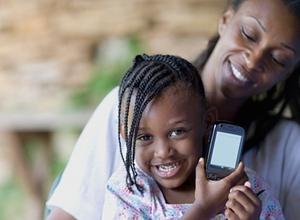By Miroslav Atanasov, Ph.D., Renmin University of China
Since Shenzhen-based Huawei had expanded to Africa in 1999, the telecommunications giant has opened training centers in seven African countries, a research and development center in Johannesburg, South Africa, and a network operations center in Cairo, Egypt.

In recent years Huawei has developed partnerships with most African nations. Aggressive pricing has motivated Africans to accept the company's initiatives in smart phone distribution and network infrastructure development.
Huawei has benefited from growth of the smart phone market in Africa, which raises demand for Big Data. The company sells at lower profit margins in Africa, but has risen on stronger revenues due to telecomm infrastructure projects, according to analyst Jean-Michel Huet.
While the United States has expressed cyber security concerns over Huawei's technology, the Chinese company has become a major competitor in the African market. Huawei is competing against BlackBerry and Nokia for a larger share in the smart phone market in the continent.
The company has sold hundreds of thousands of phones in Kenya alone and its market share stands at about 50%. In southern and eastern Africa, Huawei's revenues are expected to rise to 30% in the next two and a half years. Africa is one of the company's most important international markets. African sales of Huawei account for nearly a seventh of its total global sales.
The brand has proven successful with consumers, and Huawei has secured funding on major private and public projects in Africa. Huawei has already assisted 18 African governments to build government networks in countries including, Nigeria, Kenya, Uganda, Senegal, Angola, Guinea, and Djibouti.
Besides an aggressive marketing strategy, Huawei has led efforts to upgrade Africa's cable infrastructure. Bigger projects have been undertaken due to an ever increasing demand for bandwidth.
Huawei Marine Networks, joint venture between Huawei Technologies and Global Marine Systems, has upgraded the fiber cable used by the West Africa Cable System Consortium. The 16,000 kilometer-long cable is owned by 17 international telecom carriers from Africa and Europe; its capacity was upgraded to 100Gbps last year. Its landing station in Namibia supplies transit for landlocked countries, such as Botswana, Zambia, Zimbabwe, and Malawi.
Huawei Marine had also completed a contract from Equatorial Guinea to build a Submarine Cable System, which would allow the country connect to larger submarine cable systems. Huawei completed a $40 million contract to assist Ghanaian cities to meet rising demand for Big Data users.
Among other achievements of Huawei in Africa are:
1.Opening a new call center in South Africa.
2.Partnering with Microsoft4Africa, since 2013 to distribute Windows 8 smart phones, which was launched Huawei4Afrika - made for Africa by Africans.
3.Providing unlocked Ideos smart phones to Kenya for under $US50 each.
4.Securing a tender to build a national fibre network project in Kenya.
5.Supplying taxi Wi-Fi in South Africa.
6.Selected by Telkom South Africa to deploy a 100 Mbit/s broadband network.
7.Selected for deploying LTE backhaul networks in Angola and Namibia.
Huawei had recently introduced its new Mate 7 dual SIM technology that targets developing markets, African countries in particular. The Huawei Mate 7 phone has been designed to have a longer lasting battery that reflects the company's focus on Africa.
The company continues to expand in the region. Huawei is establishing itself in the tablet and smart phone market in Africa. In 2011 Huawei registered a $US3.4 billion turnover and dominated the continent with its 2G, 3G and even 4G networks, especially in Namibia and Angola.
The group has won a $US750 million contract to upgrade Globacom's network in Nigeria, and on the way to become a major operator there, since it invested $US627 million in cash-strapped Nitel company.
Huawei also completed the installation of a Silphium underseas cable to serve Libya and Ethiopia.
Li Dafeng, Huawei's head of East and Southern Africa regions, said, "Huawei has improved from B2B to B2C profile and is developing the necessary services clientele."
He added, "The two new Huawei models had garnered much success in the Kenya market. South African consumers, on the other hand, have preferences for Huawei's mid-range tablets and smart phones," according to Li Dafeng.
The group has supplied millions of telephones and over a million smart phones to the Eastern and Southern African markets.
The giant Chinese telecommunications company has a strong presence and future in Africa's emerging market, which would likely be there to stay.
( The opinions expressed here do not necessarily reflect the opinions of Panview or CCTV.com. )

Panview offers an alternative angle on China and the rest of the world through the analyses and opinions of experts. We also welcome outside submissions, so feel free to send in your own editorials to "globalopinion@vip.cntv.cn" for consideration.















